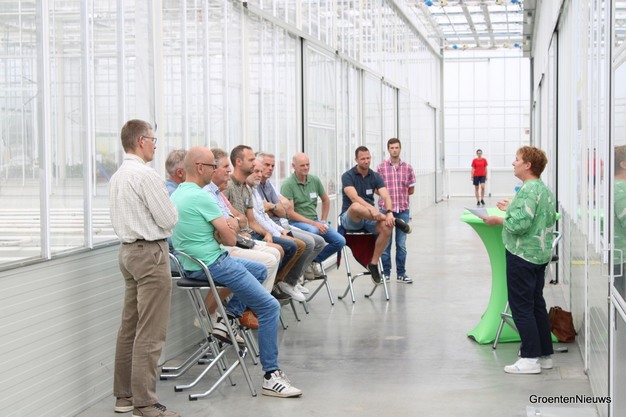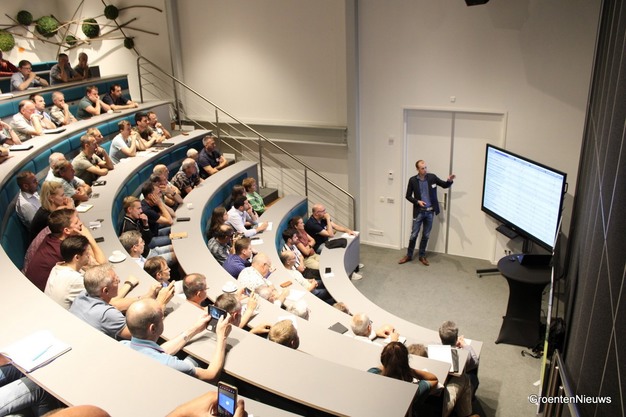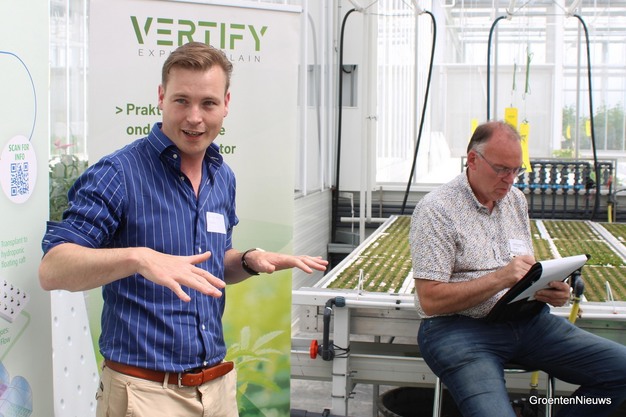Last week, a group of growers attended a lecture on water during the plenary session of Water Day at the World Horti Center in Naaldwijk. "It's been a while since we've been in lecture halls," joked one grower to his neighbor. After an hour, the lecture concluded, and it was time for workshops. There were six in total, some of which strongly resembled crop protection days in terms of theme.

Liesbeth Nijs addressing one of the six participating groups in a workshop on precision crop protection. Click here for the photo impression of the afternoon.
Customized spraying
"I never thought I'd say this, but I recently bought a new spraying machine," a floriculturalist revealed during a workshop on precision crop protection. His company was fully committed to biological methods until they encountered a problem with leafhoppers. They now attempt to combat this pest through spraying.
But at what pressure do you spray? And can you always stay within your label? These were the questions Liesbeth Nijs posed to the participants. The Plant Health Theme Specialist at Glastuinbouw Nederland highlighted the rise of 'green' agents and how they work differently from traditional agents, sometimes even systemically. With 'green agents,' you need to directly hit the pest for them to work effectively. The key message here: spray with precision.
Water Framework Directive
The message downstairs in the greenhouse complex of the World Horti Center aligned well with the plenary presentations by her colleague Guus Meis, and WUR researcher Jim van Ruijven. Guus discussed the Water Framework Directive.
By 2027, all EU member states must meet the objectives set by the Water Framework Directive (WFD), established in 2000. The goals were supposed to be met by 2015, but after two six-year extensions, the deadline is now 2027. As this deadline approaches, there are increasingly loud voices suggesting that the Netherlands will not meet these objectives.
The Policy Specialist for Water & Environment is aware of this. He calls on the sector to ensure that the failure to meet the objectives is not due to greenhouse horticulture. He is also critical of how progress is measured.
Of the many thousands of water quality standards, the Netherlands currently meets three-quarters of them. However, because a 'one out, all out' principle applies, the positive steps taken are not always clearly visible. This results in negative societal sentiment and consequential threats, such as the loss of plant protection products. This is not only due to government intervention but also because the registrant sometimes no longer wants to deal with the hassle.

Presentation by Jim van Ruijven from WUR during the plenary program. View the photo gallery of the afternoon here.
Preventing leaks
To help growers further minimize leaks from their greenhouses, Guus shared some tips with the audience, such as hanging a sturdy bag around unclear pipes to check if water might be leaking out and ending up in surface water. If that's the case, then properly capping it off is the advice.
In the spirit of 'good stewardship,' Guus had more tips and also pointed out the possibility of getting help from a water coach. This coach can assist well-meaning growers, allowing enforcers to focus on the violators.
Condensation water dehumidification systems
Growers themselves can also do a lot, provided they are aware of potential leak risks. Jim van Ruijven discussed a whole list. What could help in the future is having discussions with HortiQ, known for the certification of technical companies. Including extra technical safety measures in installations by default could further prevent water leaks.
Certain matters are also regulated by law, Jim pointed out. This applies to the reuse of condensation water from the greenhouse roof. Similarly, you can also reuse condensation water from dehumidification systems. Just a tip from the WUR researcher to encourage growers to take a step forward, in anticipation of regulations that are not yet in place for these new systems.

Bas Bekker from Meteor Systems presented the new water-based cultivation system on tables in the background. Click here for the photo report of the afternoon.
Future goals
To achieve the WFD goals, larger steps are still needed, Guus emphasized. The generic measures are more or less exhausted, so it mainly comes down to customization and activating individuals. The approximately sixty participants of Water Day received tips and advice on Thursday afternoon, as well as the necessary points for the extension of their spray license Business Management Crop Protection, part of Cultivation.
Conveniently, even with the best intentions, cultivation without the use of plant protection products is still a future goal. Just like some of the research presented in the workshops, acknowledged Margreet Schoenmakers, Program Manager Innovation Water & Plant Health at Glastuinbouw Nederland. On afternoons like these, critical feedback from growers is gathered to make further progress together.
Click here for the photo report of the Water Day 2024 event.
